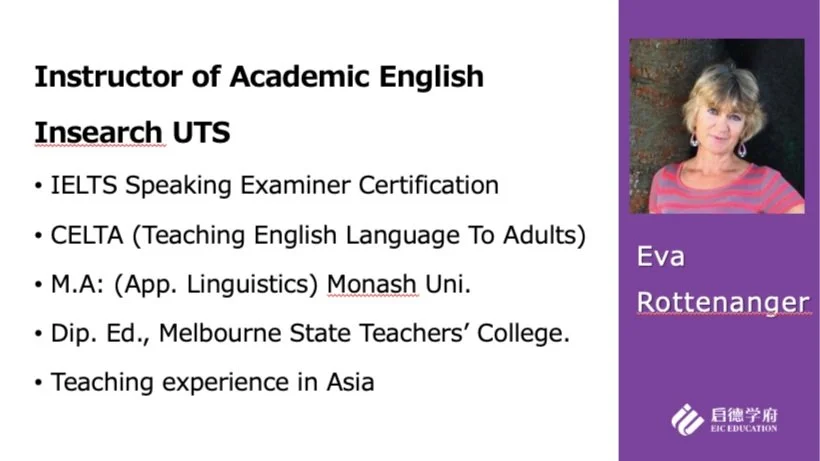Description:
Extract (on classroom conversation) from a lecture given in Beijing
Title:
How Academic English Courses Lead to Chinese Students’ Success at Western Universities
Objective:
To help reduce the anxiety among 70 IELTS tutors faced with transitioning to teach AE courses
Source:
12-years experience teaching ESL
Length:
60 minutes
Status:
Delivered
‘Conversations are particularly important in Academic English classes as it’s during these that students practise their understanding and articulation of the academic concepts offered to them via recorded lectures and academic texts. The skills needed for successful group interactions are specifically focused on in AE courses because these are the skills that students will require in a Western university academic learning environment as much of this is based on group-work. Therefore, all AE levels encourage students to practise the language skills required for negotiating and turn-taking in conversation.
However, developing the students’ conversational skills is not limited to discussing academic material. Whenever I discourage a student from speaking Chinese in class, I’m referring - not to their academic practice, but to personal utterances, with personal meaning and relevance to students and their classmates. Experience reminds me always to point out to students that it is this ‘relevant’ language that is most important - and that this will form the basis of all their other language acquisition needed for their success at university.
And so, whenever I can, I incorporate everyday conversation into the AE course on topics relevant to students because when they attend university, they’ll have to function on this level in English with International students.
That’s something you can do too. AE doesn’t have to be academic 100% of the time. There’s a place for casual conversation and negotiation. Students need to be encouraged to ‘own’ their English domain, before they’re hit with the dense language of academia. Both you and the students can ease into this, one concept at a time. A simple conversation about what students did on the weekend can include the weather. This can then be seeded with concepts of greenhouse gases and climate change – long before students are asked to digest academic texts on the issue of climate change action. The transition from General to Academic English can be smooth, one step at a time. New ‘academic’ vocabulary can be introduced through board games.
I’m constantly aware that I am doing a two-fold job and I’m sure you can identify with this. On the one hand, I’m teaching academic language skills and analytical thinking, and on the other, a way of being - that encourages students to take responsibility for their education, set goals and aim high. This way of thinking and interacting is underscored by their ability to function naturally in day-to-day life within an international community. Conversation becomes the scaffolding for their academic success.’




